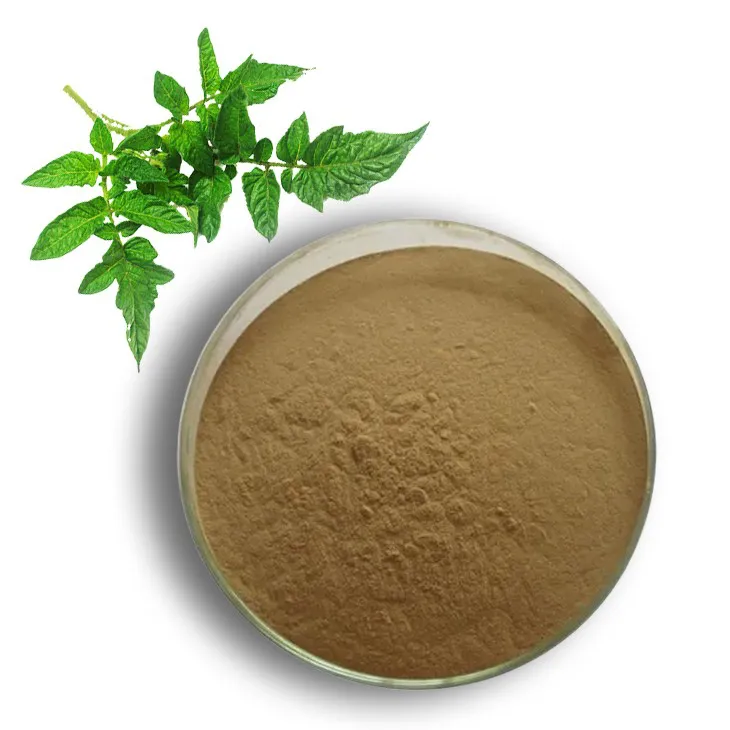- 0086-571-85302990
- sales@greenskybio.com
Does senna leaf extract have benefits for diabetes? Are these all safe and applicable for diabetic patients?
2024-11-12

1. Introduction
Diabetes is a global health concern, characterized by abnormal blood glucose levels. Management of diabetes often involves lifestyle modifications, medications, and sometimes the use of natural supplements. Senna Leaf Extract has been used in traditional medicine for various purposes. In this article, we will explore whether it has benefits for diabetes patients and its safety profile in this context.

2. What is Senna Leaf Extract?
Senna Leaf Extract is derived from the leaves of the senna plant. It contains several active compounds, such as sennosides. In traditional medicine, it has been primarily used as a laxative due to its ability to stimulate bowel movements.

3. Potential Benefits for Diabetes
3.1. Blood Glucose Regulation
Some studies suggest that certain components in senna leaf extract may have an impact on blood glucose levels. It is hypothesized that the extract might influence insulin sensitivity or glucose metabolism in the body. However, the evidence is not yet conclusive. Insulin sensitivity is crucial for diabetic patients as it determines how effectively the body can use insulin to regulate blood sugar. If senna leaf extract can improve insulin sensitivity, it could potentially help in better glycemic control.
3.2. Antioxidant Properties
Senna leaf extract may possess antioxidant properties. Oxidative stress is often associated with diabetes and its complications. Antioxidants can help neutralize free radicals in the body, which are harmful molecules that can damage cells and tissues. By reducing oxidative stress, the extract might play a role in preventing or delaying some of the long - term complications of diabetes, such as neuropathy, retinopathy, and nephropathy.

4. Safety Concerns for Diabetic Patients
4.1. Laxative Effects
The well - known laxative effect of senna leaf extract can be a double - edged sword. While it can help with constipation, which some diabetic patients may experience due to dietary changes or medications, excessive use can lead to diarrhea. Diarrhea can cause dehydration, which is especially concerning for diabetic patients as it can disrupt fluid and electrolyte balance. Dehydration can also lead to an increase in blood glucose levels, making glycemic control more difficult.
4.2. Interactions with Medications
Diabetic patients often take multiple medications, such as insulin or oral hypoglycemic agents. Senna leaf extract may interact with these medications. For example, it could potentially affect the absorption or efficacy of medications. There is also a risk that it could cause hypoglycemia (low blood sugar) if it enhances the effect of hypoglycemic drugs. On the other hand, it might interfere with the action of medications meant to control other diabetes - related conditions, such as blood pressure or cholesterol medications.
4.3. Impact on Kidney Function
Some components of senna leaf extract may be excreted through the kidneys. In diabetic patients, especially those with pre - existing kidney problems, the use of senna leaf extract could potentially put additional stress on the kidneys. This is because diabetes can already affect kidney function, and any additional burden on the kidneys needs to be carefully considered. Kidney function is vital for maintaining overall health in diabetic patients as it is involved in filtering waste products and regulating fluid and electrolyte balance.
5. Current Research and Evidence
At present, the research on the benefits of senna leaf extract for diabetes is limited. Most of the existing studies are either in vitro (in test tubes) or in animal models. While these studies can provide some initial insights, human clinical trials are needed to confirm the potential benefits and safety in diabetic patients. For example, a small - scale animal study might show that senna leaf extract can improve glucose tolerance in diabetic rats, but this does not necessarily translate to the same effect in humans.
There have been some observational studies in humans, but they are often not well - controlled and lack a large sample size. Some studies have reported anecdotal evidence of improved glycemic control in diabetic patients using senna leaf extract, but these findings need to be further investigated through rigorous scientific methods.
6. Recommendations for Diabetic Patients
Given the current state of knowledge, diabetic patients should be cautious when considering the use of senna leaf extract.
- Consult a healthcare provider: Before starting any new supplement, including senna leaf extract, diabetic patients should consult their doctor or a registered dietitian. They can provide personalized advice based on the patient's medical history, current medications, and overall health status.
- Monitor blood glucose levels closely: If a diabetic patient decides to try senna leaf extract, they should monitor their blood sugar levels more frequently. This will help them detect any changes in glycemic control, whether positive or negative, and allow for timely adjustment of their diabetes management plan.
- Be aware of potential side effects: Diabetic patients should be aware of the possible laxative effects, interactions with medications, and impact on kidney function. If they experience any unusual symptoms, such as excessive diarrhea, dizziness (which could be a sign of hypoglycemia), or changes in urine output (which could indicate kidney problems), they should stop using the extract and seek medical attention immediately.
7. Conclusion
Senna leaf extract may hold some potential benefits for diabetes patients, such as its possible role in blood glucose regulation and antioxidant properties. However, there are also significant safety concerns, especially regarding its laxative effects, potential interactions with medications, and impact on kidney function. More research, particularly well - designed human clinical trials, is needed to fully understand the benefits and risks of senna leaf extract in the context of diabetes. Until then, diabetic patients should approach the use of this extract with caution and under the guidance of a healthcare professional.
FAQ:
Question 1: How does senna leaf extract potentially affect blood glucose levels in diabetic patients?
There is currently no conclusive evidence directly showing that senna leaf extract has a definite impact on blood glucose levels in diabetic patients. Senna is mainly known for its laxative effects. However, some studies suggest that certain compounds in plants may have secondary effects on metabolic processes related to blood sugar, but more research is needed specifically on senna leaf extract in this regard.
Question 2: Can senna leaf extract improve insulin sensitivity in diabetic individuals?
As of now, there is no scientific data to support that senna leaf extract can improve insulin sensitivity in diabetic patients. Insulin sensitivity is a complex physiological parameter, and while some herbal extracts have been studied for their potential to influence it, senna has not been shown to have this effect so far.
Question 3: Are there any potential side effects of senna leaf extract for diabetic patients?
Senna leaf extract can cause some side effects such as abdominal cramps, diarrhea, and electrolyte imbalances. For diabetic patients, these side effects can be particularly concerning as they may disrupt fluid and electrolyte balance which is already a consideration in diabetes management. Diarrhea, for example, can lead to dehydration which may in turn affect blood glucose concentration and overall health.
Question 4: Is it safe to use senna leaf extract long - term for diabetic patients?
Long - term use of senna leaf extract is not advisable for diabetic patients. The chronic use of senna can lead to a condition known as cathartic colon, which may cause further digestive problems. Additionally, as mentioned before, the side effects associated with senna use can have negative impacts on diabetes management over time.
Question 5: Has there been any research on the combination of senna leaf extract and diabetes medications?
There is very limited research on the combination of senna leaf extract and diabetes medications. Given that many diabetes medications work to regulate blood glucose levels through specific mechanisms, the interaction with senna leaf extract (if any) is not well - understood. It is crucial to be cautious when considering using senna leaf extract along with diabetes medications to avoid potential adverse effects on treatment efficacy or patient safety.
Related literature
- The Effects of Herbal Supplements on Diabetes: A Review"
- "Safety and Efficacy of Botanical Extracts in Metabolic Disorders"
- "Potential Herb - Drug Interactions in Diabetes Management"
- ▶ Hesperidin
- ▶ Citrus Bioflavonoids
- ▶ Plant Extract
- ▶ lycopene
- ▶ Diosmin
- ▶ Grape seed extract
- ▶ Sea buckthorn Juice Powder
- ▶ Fruit Juice Powder
- ▶ Hops Extract
- ▶ Artichoke Extract
- ▶ Mushroom extract
- ▶ Astaxanthin
- ▶ Green Tea Extract
- ▶ Curcumin
- ▶ Horse Chestnut Extract
- ▶ Other Product
- ▶ Boswellia Serrata Extract
- ▶ Resveratrol
- ▶ Marigold Extract
- ▶ Grape Leaf Extract
- ▶ New Product
- ▶ Aminolevulinic acid
- ▶ Cranberry Extract
- ▶ Red Yeast Rice
- ▶ Red Wine Extract
-
Milk Thistle Extract
2024-11-12
-
Bayberry Extract
2024-11-12
-
Mangosteen extract powder
2024-11-12
-
Moringa powder
2024-11-12
-
Longan Extract
2024-11-12
-
Saponin Extract
2024-11-12
-
Maitake Mushroom Extract
2024-11-12
-
Yam Extract
2024-11-12
-
Oat Straw Extract Powder
2024-11-12
-
Yellow Pine Extract
2024-11-12





















